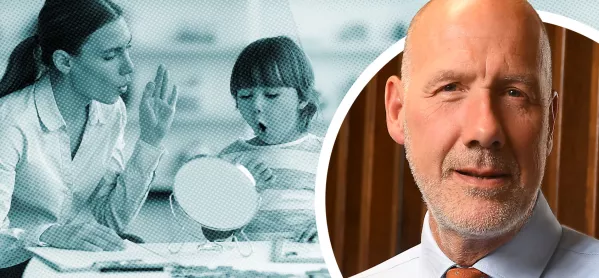The outgoing general secretary of the Association of School and College Leaders (ASCL) has been named as the chair of a new commission for oracy education.
Geoff Barton, who is stepping down from his role as general secretary of ASCL next month, will today call for a renewed effort to improve the provision and quality of oracy education amid the “rise of robots”.
The Commission on the Future of Oracy Education in England - hosted by national oracy charity Voice 21 - aims to provide a “blueprint for a national entitlement for Oracy Education in England”, its founders said today.
The formation of the commission comes after the Labour Party announced a focus on oracy in its education mission last year.
As part of its Curriculum and Assessment Review, Labour said it would explore how to weave oracy into lessons throughout school.
It also comes after Ofsted raised concerns last week over the teaching of writing and spoken language in primary and secondary schools, in an English subject report.
Also on the commission are Sally Apps, education director of the multi-academy trust Cabot Learning Federation, and Sarah Houghton, director of mental health workforce development at Place2Be.
The commission is set to outline an evidence-based framework for oracy education and define its vision, values and intent as part of a broad and enriching education in a report due out in September, Voice 21 said.
It will also make recommendations for the implementation of a national entitlement to oracy education for all children across all stages and phases of statutory education in England.
The commission is being launched as survey findings reveal that in excess of 80 per cent of business leaders and parents support more time being spent on the development of young people’s spoken language and listening skills at school.
The YouGov poll of more than 4,200 parents and 1,007 business decision makers also revealed that more than 71 per cent of business leaders back the introduction of oral examinations counting towards young people’s qualifications.
At the launch today, Mr Barton will argue that “as society changes so rapidly around us and we observe the rise of the robots, it is time to take the essential human skills of speaking and listening and move them centre stage”.
He will say that he could sense a “rising tide of support for oracy education from teachers, parents and business leaders”.
Another commissioner, Rob Drummond, professor of sociolinguistics at Manchester Metropolitan University, said: “The greater our understanding of the role of spoken language in a fair and just society, the better able we are to not only equip young people with the insights and tools required to succeed but also to challenge the societal injustices that stand in their way.”
For the latest education news and analysis delivered directly to your inbox every weekday morning, sign up to the Tes Daily newsletter




